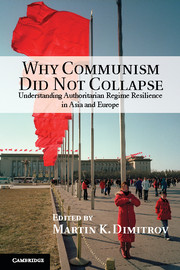Book contents
- Frontmatter
- Contents
- Tables and Figures
- List of Contributors
- Acknowledgments
- Abbreviations
- Part I Reform and Resilience
- Part II Ideology and Resilience
- 3 Ideological Erosion and the Breakdown of Communist Regimes
- 4 Ideological Introversion and Regime Survival
- Part III Contagion and Resilience
- Part IV Inclusion and Resilience
- Part V Accountability and Resilience
- Miscellaneous Bibliography
- General Bibliography
- Index
- References
3 - Ideological Erosion and the Breakdown of Communist Regimes
Published online by Cambridge University Press: 05 August 2013
- Frontmatter
- Contents
- Tables and Figures
- List of Contributors
- Acknowledgments
- Abbreviations
- Part I Reform and Resilience
- Part II Ideology and Resilience
- 3 Ideological Erosion and the Breakdown of Communist Regimes
- 4 Ideological Introversion and Regime Survival
- Part III Contagion and Resilience
- Part IV Inclusion and Resilience
- Part V Accountability and Resilience
- Miscellaneous Bibliography
- General Bibliography
- Index
- References
Summary
INTRODUCTION
Communist regimes are partocratic ideocracies (as discussed by authors such as Leonard Schapiro, Alain Besançon, A. Avtorkhanov, and Martin Malia). Their only claim to legitimacy was purely ideological, that is, derived from the organized belief system shared by the elites and inculcated into the masses that the party benefited by special access to historical truth and therefore it enjoys infallibility. If this interpretation is correct, then de-radicalization (Robert C. Tucker), primarily in the field of ideological monopoly, leads to increased vulnerability. The demise of the supreme leader (Stalin, Mao, Hoxha) has always ushered in ideological anarchy and loss of self-confidence among the rulers. Attempts to restore the “betrayed values” of the original project (Khrushchev, Gorbachev) resulted in ideological disarray, change of mind among former supporters, desertion of critical intellectuals from the “fortress,” criticism of the old dogmas, awakening, a break with the past, and eventually, as in the case of Kołakowski or the Budapest school, apostasy.
This chapter looks into the adventures of critical Marxism in Soviet-style regimes and its corrosive impact on the “Moscow Center” during the 1970s and particularly the 1980s. I conceptualize the “Gorbachev phenomenon” as a culmination of the revisionist ethos in the socialist bloc, which implicitly turns the focus of my contribution to the inherent paradoxes and fallacies of his perestroika. The latter are perceived to be inherent in the incompleteness of revisionism’s promise for change. Nevertheless, I by no means deny the role of this fascinating chapter of intellectual and political history in providing a fundamental lesson about the role of ideas in the disintegration of authoritarian regimes of Leninist persuasion. What I do state is that only the reinvention of politics operated by the dissident movements could offer the possibility to achieve genuine democracy and full liberty in Eastern Europe and the Soviet Union. I will also introduce the cases of China and North Korea in order to situate the demise of communism and Gorbachev’s reform within a comparative framework. I argue that communism in China has survived because, in the aftermath of the Tiananmen repression, the party created avenues of reintegration for the intellectual elite, thus lowering the impact of dissent and opposition. I therefore counterpose the sequence, so typical of communism’s evolution in Europe, revisionism to apostasy, to what I have called the technocratic revisionism of post-1989 Chinese intellectuals.
- Type
- Chapter
- Information
- Why Communism Did Not CollapseUnderstanding Authoritarian Regime Resilience in Asia and Europe, pp. 67 - 98Publisher: Cambridge University PressPrint publication year: 2013
References
- 1
- Cited by



